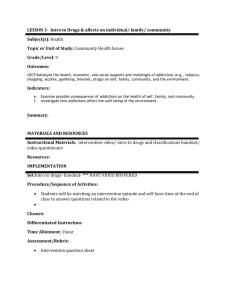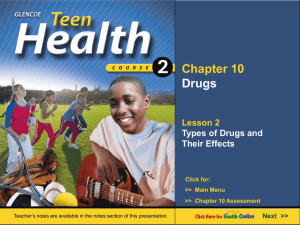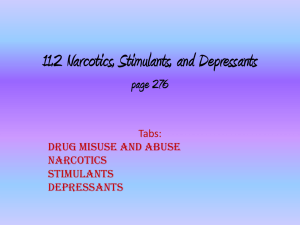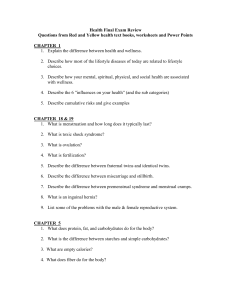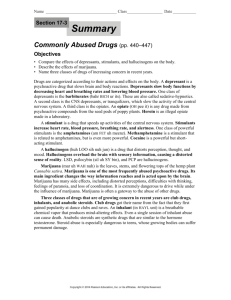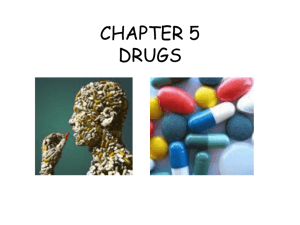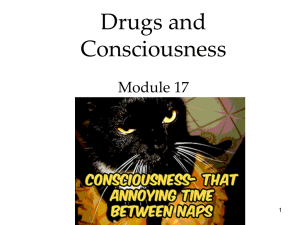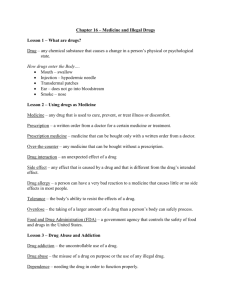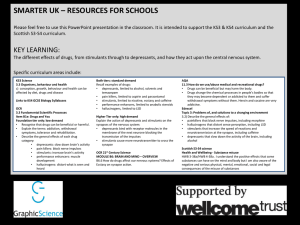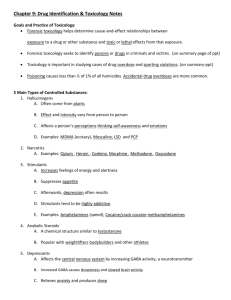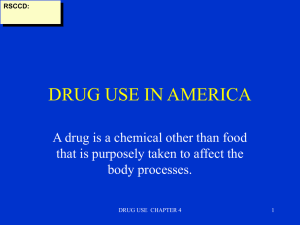Chapter Ten Lesson Two
advertisement
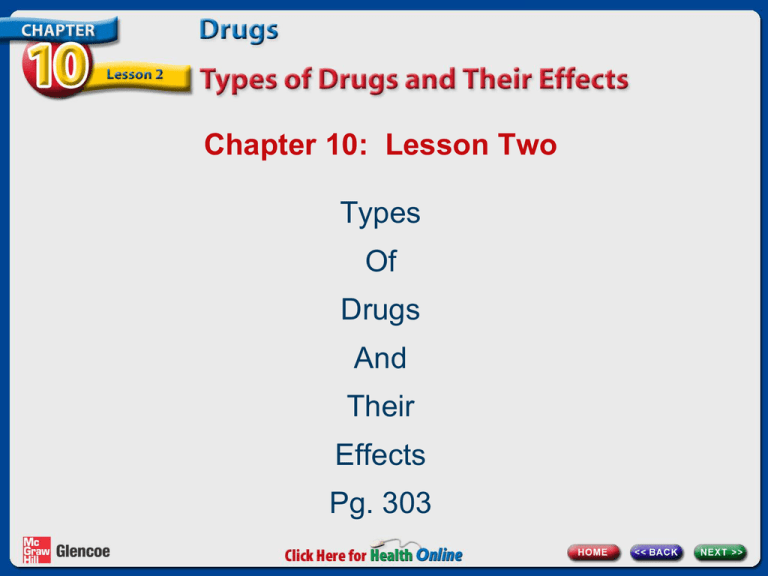
Chapter 10: Lesson Two Types Of Drugs And Their Effects Pg. 303 Drug Use and the Body When a person uses a drug over time, he or she can develop a tolerance to the drug. tolerance The body’s need for larger and larger amounts of a drug to produce the same effect Drug Use and the Body People can overdose on a drug. overdose Taking more of a drug than the body can handle Types of Drugs Stimulants Depressants All types of drugs can be harmful to your physical, mental/emotional, and social health. Club Drugs Narcotics Inhalants Hallucinogens Steroids Stimulants When a stimulant wears off, the user often feels exhausted and irritable. stimulant A drug that speeds up the body’s functions Stimulants affect a person’s mental/emotional health by giving a false sense of energy, well-being, confidence, and power. Stimulants Amphetamines are also called speed. amphetamines Strong stimulant drugs that speed up the nervous system Examples of amphetamines include methamphetamine, cocaine, and crack. Amphetamines Medical Uses such as ADD/ADHD Can be swallowed, inhaled, smoked or injected Depressants Depressants do the opposite of stimulants. depressants Drugs that slow down the body’s functions and reactions, including heart and breathing rates Depressants can affect a person mentally and emotionally by giving a false sense of well-being through reduced anxiety and relaxation. Depressants Examples of depressants include tranquilizers, barbiturates, and alcohol. Misuse and abuse of depressants can lead to coma or even death. Depressants Most depressants come in capsule or tablet form Medical use is for anxiety. Tranquilizers Effects of Stimulants and Depressants Effects/Possibility of Addiction Stimulants Depressants Physical effects Speeds up body functions, such as heart rate, breathing rate, and blood pressure Slow down body functions, such as coordination Mental/emotional effects False sense of energy, wellbeing, confidence, and power False sense of well-being through reduced anxiety and relaxation Effects when the drugs wear off Exhaustion and mental imbalance Depression, mood swings Addictive? Yes Yes Marijuana Marijuana is also known as “pot” or “weed.” For some people, marijuana is a stimulant. For others, it is a depressant. Marijuana Long-term effects of marijuana use include: Lung damage Low testosterone levels in males Sperm reduction in males Irregular periods in females Club Drugs Club drugs are often made in home laboratories and mixed with other harmful chemicals. Ketamine Ecstasy Rohypnol club drugs Illegal drugs that are found mostly in nightclubs or at all-night dances parties called raves Club Drugs Ecstasy Rohypnol Ketamine • Also known as “X” • Increase heart rate and body temperature • Also known as the date-rape drug or “roofies” • Also known as “special K” • Is an anesthetic • Can damage organs • Can make a person feel anxious and paranoid • Causes a drop in blood pressure • Causes blackouts • Causes memory loss • Causes hallucinations • Causes memory loss • An overdose can cause a person to stop breathing • Causes death in many teens who use it Narcotics are highly addictive drugs. Medical Use: pain reliever/usually by prescription narcotics Drugs that get rid of pain and dull the senses Morphine, codeine, and heroin are examples of narcotics. Herion Morphine Narcotics Hallucinogens cause people to become disoriented, confused, or less sensitive to pain. hallucinogens Drugs that distort moods, thoughts, and senses Hallucinogens may create imaginary images in the user’s mind. There are no medical uses for hallucinogens. Inhalants cause extreme permanent damage to the brain. inhalants The vapors of chemicals that are sniffed or inhaled to get a “high” Most inhalants come from household products that are not meant to be taken into the body. Steroids Steroids are drugs that are either human hormones or similar to hormones found in the human body. People who use steroids may have problems controlling their anger. Steroids The effects of steroid use include: Shrunken testicles in males Deeper voices, excess facial hair, and a masculine-looking body for females Increased risk of heart disease, high blood pressure, stroke, cancer, sterility, hair loss, severe acne, liver damage, kidney damage, and depression The Effects of Drugs on Unborn Babies Pregnant females who use drugs, alcohol, or tobacco often give birth to low-weight babies and babies with brain problems. A pregnant female who shares needles with other heroin users risks infecting herself and her baby with HIV.
